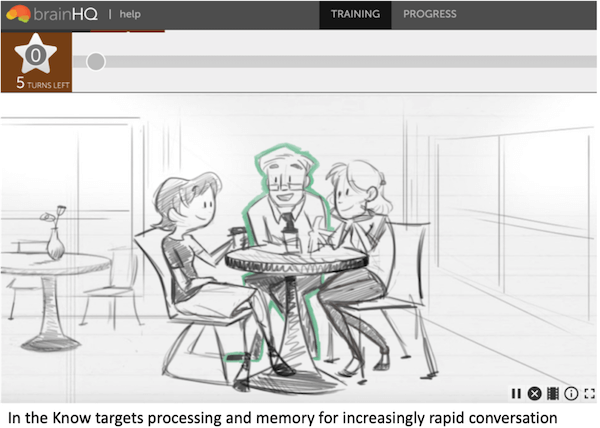By Dr. Henry Mahncke
It is increasingly well-documented that hearing loss is likely the largest modifiable risk factor for dementia — more important than quitting smoking, managing blood pressure, getting physical exercise or overcoming social isolation. This was pointed out in a 2017 medical report in The Lancet and reiterated as recently as December, 2019 in The New York Times.
And, if you (or a loved one) are suffering hearing loss, getting treatment — which often means a hearing aid — can be the most significant thing you do to reduce dementia risk (and better hear the people around you).
How does hearing loss increase dementia risk?
As a neuroscientist, I study the operation of the brain, and the answer may surprise you. It’s not so much the hearing loss that drives dementia risk, the real culprits are changes in your brain that drive the hearing loss. Let me explain.
Beginning in our late 20s, the brain’s speed of processing begins to slow. The changes are small but accumulate with each passing year. By the time we enter our 40s, and with each successive decade, the brain becomes measurably (and noticeably) slower.
When it comes to hearing, many find that in our 50s the interjection “Huh?” becomes a more and more frequent response to what others say. It’s not that you didn’t hear them — if you hadn’t heard them, you wouldn’t have said anything — but, at that particular moment, their speech came in faster than you could process it.
Typically, speech contains about 10-20 speech events per second (think of a speech event as a change in a vowel or consonant), which works out to a processing speed of 50-100 milliseconds per event. Studies show by their early 70s, most people are processing at a slower rate, and operating not based on capturing the fine details of speech, but instead on capturing enough of the speech to reliably interpret its meaning within the context of what is being discussed.
Another thing about cognitive aging is there also is a degradation in the accuracy of sensory perceptions. An example — unrelated to hearing — is that an 80-year-old relative may observe they just don’t make that chocolate bar the way they used to. In fact, the recipe has not changed, but our taste buds have.
Similarly, when it comes to hearing, the hair cells (stereocilia) in the cochlea — which is the part of the ear that captures sound waves and turns them into electric impulses that the brain interprets as sound — become more brittle as we age, meaning we have trouble accurately capturing high frequencies. Voices of children and women tend to use higher frequencies, as do certain parts of speech, such as the consonants s, h, f (and many other speech events).
This age-related high frequency hearing loss is called presbycusis. It’s a bit like being on a cell phone connection that keeps going in and out. This issue is magnified by the overall slowing of the brain processing, since higher frequencies are in fact those with faster vibration of sound.
These factors combine to create what we neuroscientists describe in lay terms as a “noisy” brain processing. You are no longer capturing all the fine detail. Noisy processing leads to lower cognitive function and lower performance in the world — when that gets bad enough to be a severe decline in cognitive abilities and in real world function, it’s the very definition of dementia.
So, what does this mean for us?
Two things.
First, if you have hearing loss that can be helped by a hearing aid, you should get one —not only so those around you are less annoyed, but for your overall brain health.
Second, engage in behaviors that challenge your brain to operate faster and with greater sensory precision. For hearing, that could be learning to play a musical instrument, to speak a foreign language, or engaging in a specific type of computerized brain exercises.
In the past two years, some Medicare Advantage plans and hearing aid providers have begun offering computerized brain exercises shown to improve speed of processing and accuracy. I know about this because I helped develop the exercises in BrainHQ, which are used not only by older adults with these concerns, but by others who see benefits from having a faster brain, such as pro athletes and elite military forces. In fact, a faster and more accurate brain is of benefit just about every waking moment.
Dr. Henry Mahncke received his PhD in neuroscience in the UCSF lab that discovered that the brain remains plastic — capable of change — throughout life, before being asked by his academic mentor to lead the science team that makes BrainHQ.

